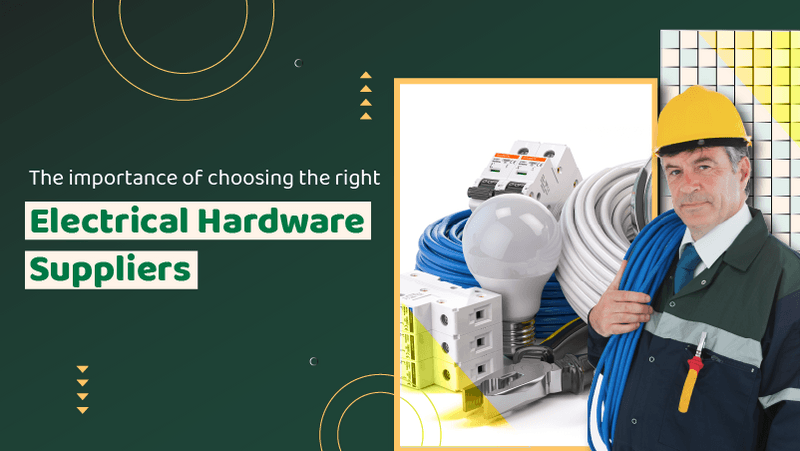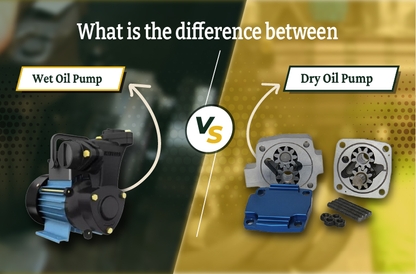Are you dealing with an electrical project like building or fixing things? Then, you need the right company that helps supply electrical parts. Parts like wires and switches are the backbone of any project, whether it's home, office, or a huge industry. Choosing the right hardware electrical supplier is important as it knows how things work safely.

On the contrary, using low-quality parts causes problems like things not working or getting into risky situations. Hence, it's crucial to find a supplier that sells good stuff and gives good support, if something goes wrong.
In this guide, we will explain why choosing the right electrical products and tools from Wholesalers is important and give tips on how to choose them wisely. If buyers understand these, they can avoid many problems and make better projects that help keep electrical systems safe and secure for the long haul.
Factors to consider when choosing the right electrical hardware suppliers

Product Quality
Safety Measures : Safety is the most important factor in the electrical system. In this case, high-quality hardware undergoes rough tests and adheres to meet strict safety standards.
Plus, it minimizes the risk of electrical hazards such as short circuits, fires, and electrocutions. Choosing the right hardware electrical supplier ensures the well-being of workers and occupants too.
Durability and longevity : If a buyer invests in durable hardware, it pays back in the long run. Moreover, it reduces the frequency of replacement, downtime, and maintenance costs.
High-quality materials and their makers have a huge hand in the longevity of electrical hardware that withstands the rigors of daily use and environmental factors.
By choosing a wholesale electrical item supplier, a business can overcome the risk associated with premature failures and expenses.
Performance and efficiency : The performance of the electrical system depends upon the quality of the material used to make it. Superior hardware components outperform consistency, efficiency, and compatibility with other system elements.
By using high-quality products businesses can optimize energy efficiency, minimize wastage, and increase overall system performance that leads to cost-saving and environmental benefits.
Reliability and reputation
Consistency in supply : Reliability goes hand in hand with buying electrical equipment from wholesalers. A strong supply chain management system with adequate inventory management practices allows suppliers to meet the demands of customers promptly.
Partnering with reliable suppliers reduces risk of project delays and downtime to enhance productivity and profitability.
On-time delivery : A reliable supplier makes sure that its product is available on time and the supplier is good enough in customer support. It is essential for project planning and execution in time-sensitive industries such as construction and manufacturing.
Suppliers who are committed to on-time delivery demonstrate reliability and commitment to customer satisfaction. By sticking to timely delivery, suppliers largely contribute to the seamless progression of projects and minimize disruption to operations.
Supplier support and service : Effective customer support is important when it comes to addressing queries, resolving problems, and providing technical assistance. Suppliers' expertise in offering responsive and knowledgeable customer support increases the overall experience of customers.
Whether it's regarding troubleshooting system issues or searching for product recommendations, reliable supplier support makes sure that it has smooth project implementation and ongoing operational efficiency.
Range of products and innovations
Customization options : “One-size-fits-all”, these approaches don't suit the electrical system. The customization option allows the business to tailor hardware components to specific needs and preferences.
Suppliers who offer customized services enable more flexibility in design and functionality to empower businesses to achieve their desired outcomes more effectively.
Compatibility with ongoing systems : Seamlessly integrating with existing systems reduces compatibility issues and maximizes efficiency.
Suppliers offering compatible hardware components streamline the integration process, by reducing downtime and rework.
Compatibility with existing infrastructure allows businesses to leverage their investment and optimize the performance of electrical systems.
Innovation and technological advancement : Suppliers who prioritize innovations and R&D efforts provide cutting-edge solutions to address emerging challenges and opportunities. Innovative hardware products give businesses a competitive edge, increase their capabilities, and future-proof their operations.
Technical expertise and support
Detailed product selection assistance : While choosing the right hardware electrical supplier, directing to a range of products can be a challenging task, especially when specific requirements or constraints are involved.
The right supplier serves as a trusted advisor through the entire procurement process, helping in product selection by recommending solutions that meet the buyer's requirements and budget.
Guidance in the product life cycle : On the contrary, suppliers committing to customer success offer comprehensive support services including installation guidance, training programs, and ongoing assistance.
Whether it's about providing detailed installation instructions or providing remote troubleshooting assistance, these suppliers make sure that clients have the necessary resources and expertise to implement and maintain their electrical systems effectively.
Expert knowledge in critical industries : In complicated industrial settings, where precision and reliability matter, expert advice can’t be taken lightly. For instance, in manufacturing facilities where downtime results in significant financial losses, access to timely and accurate technical support is paramount.
If you are thinking of buying bulk electrical products and tools directly from suppliers, they should be the ones to prioritize customer satisfaction and invest in building a knowledgeable support team that allows businesses to mitigate risk, minimize disruptions, and maximize uptime.
Customer service and communication
Addressing queries and concerns : If you buy electrical items & accessories, the suppliers should address queries and concerns promptly. It also involves accessible communication channels such as phone, email, live chat, and online portals.
They concentrate on personalized assistance in which the suppliers assign a dedicated account manager or customer service representative to handle complex queries or high-value accounts.
Resolving issues and challenges : Suppliers who prioritize active listening, and empathize with customer experience ask clarifying questions to make sure a thorough understanding of the issue before proposing solutions.
On the other side, proactive problem-solving is another aspect of suppliers while taking ownership of issues and working to find a solution rather than passing responsibility on to customers.
Additionally, follow-ups and feedback are important to take follow-up with customers after issue resolution to ensure satisfaction and collect feedback for continuous improvement.
Post-purchase support : If you buy electrical tools and equipment online, they provide guidance and support regarding product installation, setup, and configuration to ensure a smooth implementation.
Additionally, suppliers offer training sessions or workshops to educate customers on how to effectively use and maximize the benefits of the purchased products or services.
They also inform customers about available upgrades, updates, or new features that may enhance their experience or address emerging needs.
Additionally, suppliers offer loyalty incentives, discounts, or exclusive access to new products or services as a gesture of appreciation for ongoing customer loyalty.
Costs and pricing
Total cost of ownership : As upfront costs are significantly considered, evaluating the total cost of ownership gives a more holistic approach.
Factors such as maintenance, support, and energy consumption contribute to the overall cost of owning and operating electrical systems.
A thorough research if conducted for cost analysis, businesses can make informed decisions to optimize long-term value and sustainability.
Negotiating strategies : If the negotiating strategies are tactical by the buyer, it yields favorable pricing agreements and concessions from suppliers.
By building strong relationships based on trust and mutual benefits, it lays a foundation for successful negotiation.
If their leverage points and priorities are understood well, businesses can negotiate pricing terms to align with budgetary constraints and value expectations.
Value-added services : On the contrary, value-added services such as training, technical support and warranty coverage enhance the overall value proposition offered by suppliers.
By choosing the right hardware electrical suppliers, businesses can maximize the return on their investment and electrical hardware.
Environmental and ethical consideration
Aligning with corporate values : It integrates environmental and ethical considerations into the core values and mission of the organization.
This requires a commitment from suppliers to prioritize sustainability and ethical practices in all aspects of business. If these values are embedded into organizational culture, companies can make sure that sustainability and ethics become an important part of the decision-making process and business operations.
Sustainability initiatives : This practice involves minimizing environmental impact and promoting long-term ecological balance. It may include reducing carbon emissions, conserving natural resources, and implementing renewable energy solutions.
If companies invest in sustainable technologies and practices, businesses can reduce their environmental footprint and contribute to the transition to a sustainable future.
Ethical sourcing practices : Ethical sourcing practices include ensuring that products and materials are sourced in a manner to uphold ethical standards and respect human rights.
If companies prioritize ethical sourcing practices, organizations can support fair labor practices, promote social justice, and mitigate the risk of reputational damage associated with unethical behavior.
Conclusion
In conclusion, the importance of choosing the right electrical hardware suppliers cannot be overstated.
By prioritizing factors such as quality, reliability, range of products, and cost-effectiveness, businesses can mitigate risks, optimize performance, and achieve their objectives more effectively.
Through strategic supplier selection and ongoing collaboration, businesses can build resilient electrical systems that drive innovation, productivity, and sustainable growth.
Ready to power up your projects?
Choose the right electrical hardware suppliers today!



